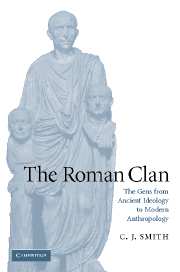Book contents
- Frontmatter
- Contents
- List of illustrations
- Preface
- List of abbreviations
- General introduction
- Part I THE EVIDENCE FOR THE GENS
- Part II TOWARDS AN INTERPRETATION OF THE GENS
- Chapter 5 The Roman community
- Chapter 6 The Roman curiae
- Chapter 7 The patricians and the land
- Chapter 8 The patriciate
- Chapter 9 Warfare in the regal and early Republican periods
- Chapter 10 Explaining the gens
- Chapter 11 Roman history and the modern world
- Appendix 1 Dionysius of Halicarnassus on the Roman curiae and religion
- Appendix 2 The missing curiae
- Select bibliography
- General index
- Index of ancient persons
- Index of passages discussed
Chapter 9 - Warfare in the regal and early Republican periods
Published online by Cambridge University Press: 22 September 2009
- Frontmatter
- Contents
- List of illustrations
- Preface
- List of abbreviations
- General introduction
- Part I THE EVIDENCE FOR THE GENS
- Part II TOWARDS AN INTERPRETATION OF THE GENS
- Chapter 5 The Roman community
- Chapter 6 The Roman curiae
- Chapter 7 The patricians and the land
- Chapter 8 The patriciate
- Chapter 9 Warfare in the regal and early Republican periods
- Chapter 10 Explaining the gens
- Chapter 11 Roman history and the modern world
- Appendix 1 Dionysius of Halicarnassus on the Roman curiae and religion
- Appendix 2 The missing curiae
- Select bibliography
- General index
- Index of ancient persons
- Index of passages discussed
Summary
THE EARLY ROMAN ARMY
In order to find the proper context within which the gens operated, we have investigated other structures of the Roman community. We have discussed the nature of the patriciate, and the ways in which the political assemblies of Rome developed, and we have seen a picture of extraordinary complexity. Continuing, overlapping and competing spheres of influence have characterised our whole account hitherto, and archaic and early Republican Rome appears a difficult, strange and complex world, far from the easy dichotomies and the straightforward historical evolution which characterise the ancient sources, and some modern accounts. If anything has been thought certain about early Rome, it is its belligerence, and its military organisation, yet we have already seen ways in which the structures and hierarchies governing warfare prove more rather than less intricate. Where does this leave the Roman military might? This chapter pulls together various themes addressed at various stages in what precedes, and it has three purposes. First, it represents an attempt to understand the nature of early Roman warfare, and what that tells us about a range of issues, including the nature of patron–client relationships in this period, and the value of the archaeological record in understanding them. Second, concentration on warfare allows us to address a part of the activities of the gens as represented through the famous exploits of the Fabii for instance.
- Type
- Chapter
- Information
- The Roman ClanThe Gens from Ancient Ideology to Modern Anthropology, pp. 281 - 298Publisher: Cambridge University PressPrint publication year: 2006



